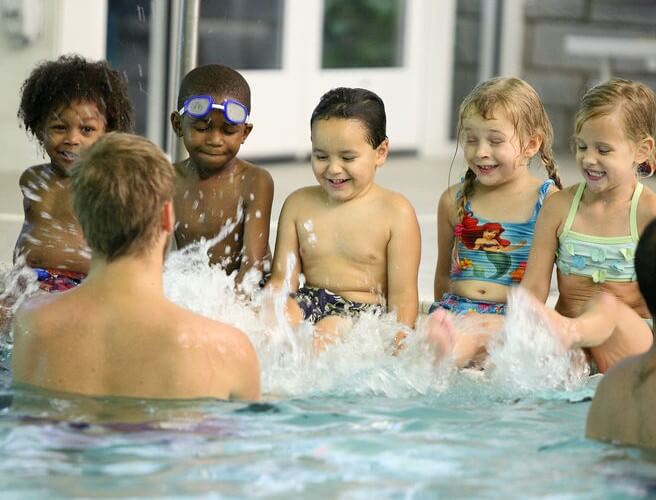Chicago Wolfpack Aquatic Club Instills Proper Training Habits Early

By Brianna Hines, Swimming World College Intern
Training Habits
I remember swimming in a club practice and noticing swimmer after swimmer taking two lazy strokes after the flag, casually standing up and then walking to the wall. I was absolutely appalled. “How can you possibly know what your time is if you aren’t even finishing the 100!?!” And while my reaction may have surprised the group of 13-year-olds, the event seemed like more of a tragic training habit than my own pet peeve.
Where It All Begins
While some swimmers seem to have talent that can only stem from the natural characteristics of an ocean life animal: flippers, fins and gills; even the most legendary champions are taught to blow bubbles and float on their back before becoming experts in the water. And though many believe the work and improvement of an athlete begins with club training, for Chicago Wolfpack Aquatic Club, swim lessons are where habits are formed.
Chicago Wolfpack Aquatic Club (CWAC) is not only known for having one of the most diverse swim lessons programs in the Chicago area, but also for its range of levels and detail-oriented focus. The instructors are highly qualified college swimmers possessing experience as well as a genuine understanding for proper technique, creating uniqueness for the program.
Though many swim lessons programs are purely purposed for safety, Sam Stephens, lessons director and swim coach, organizes a program that provides a little more:
“Being as our program is strongly affiliated with competitive swimming, it only made sense that we build our program around that. Of course, not all swimmers in the program will graduate to swim team, so I do make sure the program is still giving swimmers a comprehensive understanding of water and how to act while around and in it. “
The program includes six levels, starting with level 1 Pups and ending with Pack Prep, and teaches kids the wonderful skill of swimming while preparing them for club training.
Doin’ It Right
“What I have learned over the years: swimming is hard. It is hard to do, it is hard to teach, and it is had to understand, but once it all clicks it really is the funnest sport,” Stephens said.
The phrase, “you can’t teach an old dog new tricks” can be very appropriate to changing habits of experienced swimmers. Because of muscle memory, training flaws are considerably more difficult to fix as the swimmer becomes older.
Teaching an age group swimmer the correct head position in freestyle requires repetition and constant attention from the coach. This can be avoided by teaching this technique to the swimmer when they are beginning to learn the stroke. A coach’s worst nightmare is spending time repeatedly fixing mistakes.
CWAC holds their instructors accountable for teaching kids proper techniques right away as it helps swimmers progress when they move from level to level. As the swimmers are moved into the more advanced levels they are taught behaviors such as reading the clock, memorizing sets, practicing and understanding drills as well as an introduction to endurance swimming.
This creates the perfect foundation for the club atmosphere. When the little wolf is graduated from Pack Prep, the proper behaviors are already an expectation. The philosophy behind their program creates a feed of club ready swimmers who are now ready to focus on working hard.
Taking It To The Next Level
While this seems as the perfect solution for every coach who has to correct streamlines, over and over…the system is not flawless. Changes and technical improvements are still necessary to enforce in practice, but teaching proper habits early makes this task much easier.
“In the years since I have taken over we have graduated almost 50 swimmers from the program who were ‘swim team ready,'” Stephens said. “We can not take the credit for the success they have had since joining CWAC, but I like to think that without the dedication of our instructors and the enthusiasm they put into teaching these skills, the swimmers would not have done as well at the start.“





Paul Robert Anderson